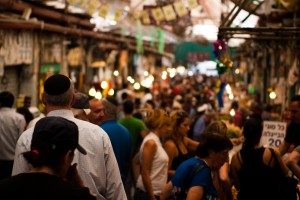“Ten shekels for pitas! Ten shekels for pitas!” bellows a shop owner in Hebrew, slamming on the counter for emphasis. It is Friday, and the din resounding at the Machane Yehudah market in Jerusalem crescendos as a horde of shoppers streams into the market to buy supplies before the Sabbath.
The high noon sun beats down on the hustling shoppers on the main strip of the kosher market. Floating through the air is the lilting music of a street musician. A stagnant cloud of heat looms around a bakery where pitas are constantly being flipped out of ovens and packaged. A shop owner wildly swats at the ever present flies hovering over his desserts, a grocer hurriedly attends to a continuous stream of shoppers, and a clothing store owner skillfully haggles with determined customers.
Under the canvas covered portion of the market, a weaving mass of shoppers push through the walkways, often bumping into each other–the more courteous offering a polite “slechah”–and prodding forward. Despite the gyrating hanging fans, the air remains dormant and thick. Rows of fresh, Israeli fruits and vegetables including large, juicy carrots, plump tomatoes, bursting clusters of red grapes, and pitayas, the colorful, prickly fruits of cacti line the storefronts. In front of a deli, a man wearing a decorative crown offers cubes of cheese to passersby. Standing in front of a juice stall is a line of shoppers waiting for freshly pressed carrot, orange, or pomegranate juice. The appetizing smell of fried fish wafting from a bustling fast food joint is later prevailed by the musty smell of fish in pails at the nearby fish market. As the afternoon wanes, the crowd dwindles, and the clamor gradually diminishes. By late afternoon, the market is closed for the Sabbath, the squeaky metal storefronts are pulled down and secured, and the smooth, stone walkways are ready to be hosed down after nightfall.
April, 2013


